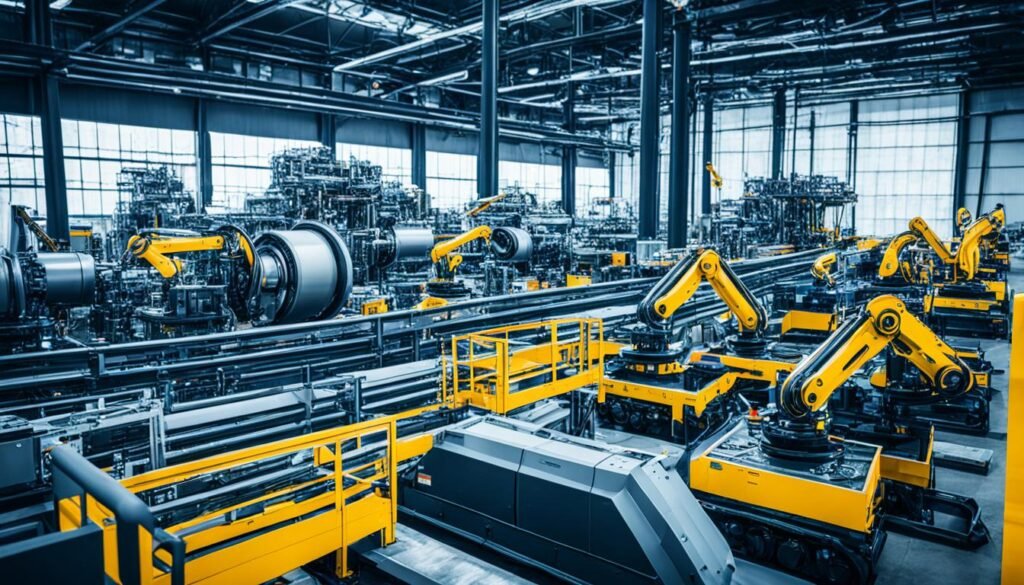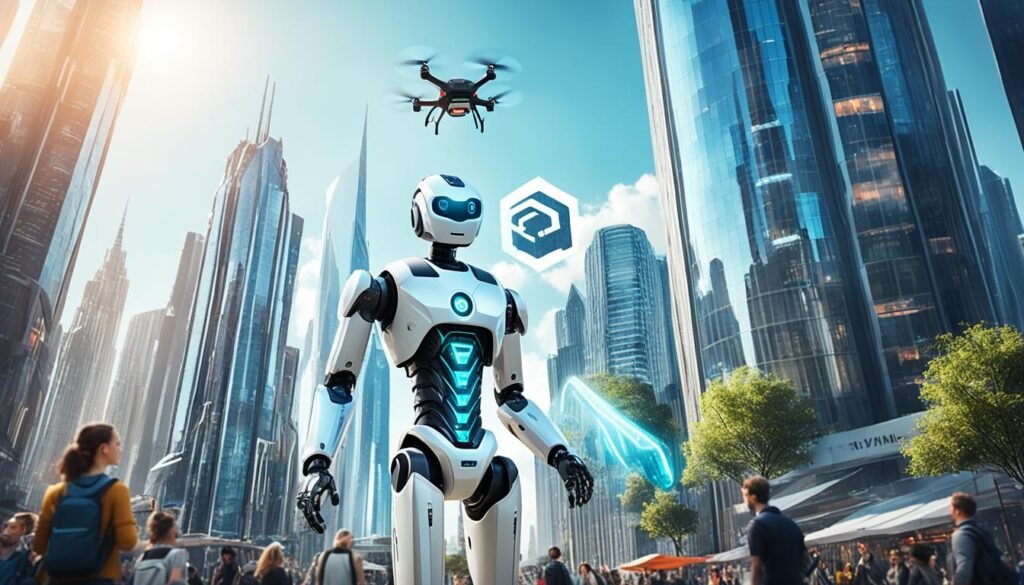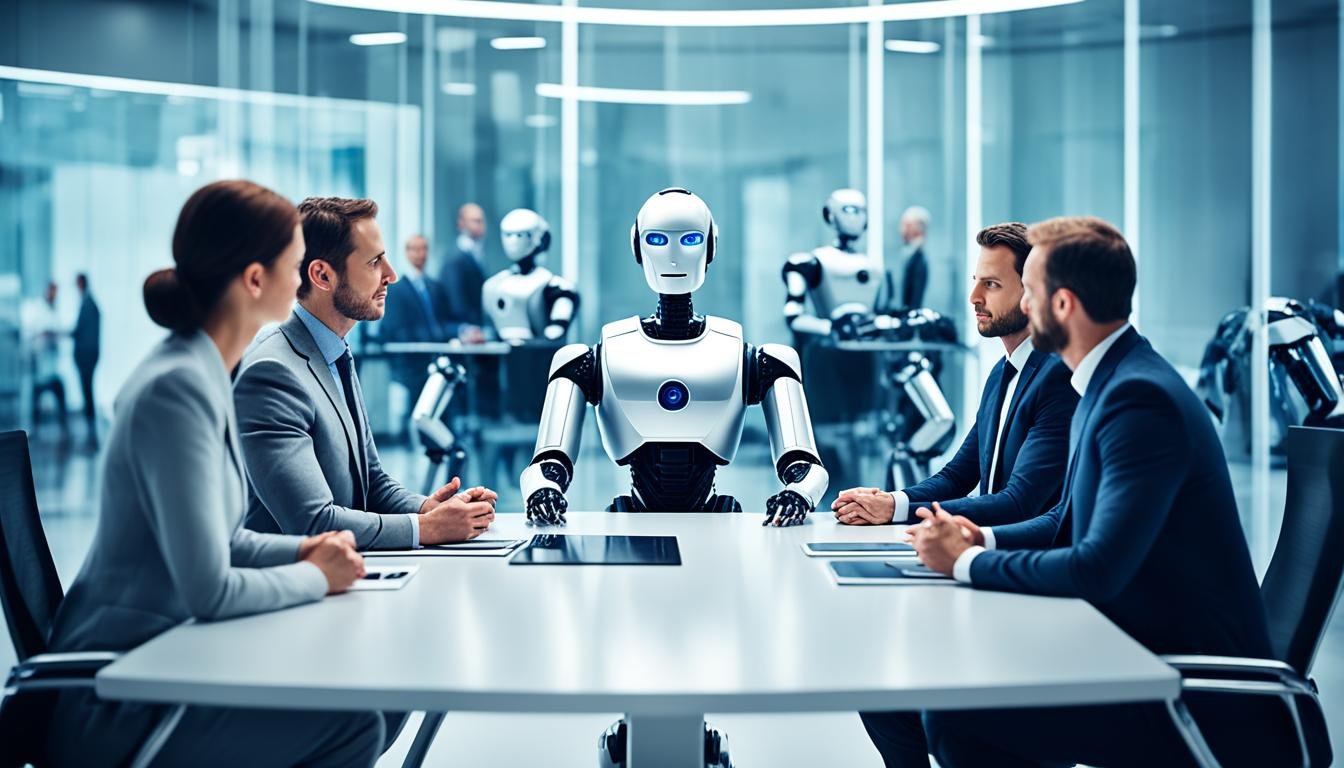The global AI market is set to grow at a huge rate of 38.1% each year from 2022 to 2030. This shows that artificial intelligence (AI) will change how your business works and competes. By 2024 and later, AI will play a big role in many business areas.
It will help increase productivity, reduce costs, and improve how decisions are made. It will also make customer experiences better.
Key Takeaways
- The global AI market is expected to grow rapidly, underscoring the increasing importance of AI in the business world.
- AI will be instrumental in driving productivity, cost savings, and improved decision-making for businesses.
- AI-powered customer experience enhancements will be a key focus for companies in the coming years.
- Businesses that embrace AI and integrate it into their operations will gain a competitive edge.
- Preparing for the transformative impact of AI on the workforce and business models is crucial for future success.
The Transformative Power of AI
Artificial intelligence (AI) has changed the business world a lot. It’s changed how companies work and compete. AI has made processes smoother and improved customer experiences. Its rapid growth and adoption show its huge potential to boost productivity and economic growth.
AI’s Rapid Growth and Adoption
A recent survey by McKinsey found that 63% of companies that added AI in 2023 saw their revenue go up. This shows how big the benefits are for businesses using AI every day. As AI gets better, it’s expected to make the workforce twice as efficient and increase profits by 38% by 2035, according to Accenture.
AI’s Potential to Drive Productivity and Economic Growth
AI’s impact goes way beyond just businesses. Gartner says companies using AI will have twice the market share and be 10 times more efficient than their rivals in 2024. This shows how AI can greatly increase productivity and economic growth. AI can automate tasks, give important insights for planning, and make customer experiences more personal.
The use of AI is growing fast, and its effect on businesses will be huge. It will make operations smoother and improve decision-making. Companies that use AI will be ahead in the competitive business world.
“AI is not just the future – it’s the present. Businesses that fail to integrate AI into their operations risk falling behind their competitors.”
AI Across Industries
AI is changing how businesses work and serve their customers across almost every sector. It’s making a big difference in healthcare, mining, banking, and more. AI is bringing new efficiencies and changing the game.
AI in Healthcare: Revolutionizing Patient Care
In healthcare, AI is making a big difference. Now, 38% of healthcare providers use AI to help with patient diagnoses. By 2026, AI could save the healthcare industry up to $150 billion a year.
AI is improving things like medical imaging, finding new drugs, and making treatment plans more personal. This is making healthcare better for patients and leading to better health outcomes.
AI in Mining: Enhancing Operational Efficiency
The mining industry is also using AI to make things better. A study by Deloitte found that AI made data processes 18 times faster than before. AI is helping with things like predictive maintenance and self-driving vehicles.
This is making mining safer, cutting costs, and making operations more efficient.
AI in Banking: Improving Customer Experience and Fraud Detection
The banking sector is really into AI too. By 2024, banks will be investing a lot in AI. This includes things like digital assistants and better risk management.
AI is helping banks fight fraud better and offer services that are more tailored to customers. This is making banking better for everyone.
AI is changing many industries in big ways. As companies use more AI, we’ll see huge improvements in how things get done. This will make things more efficient and better for customers.
| Industry | AI Applications | Key Benefits |
|---|---|---|
| Healthcare |
|
|
| Mining |
|
|
| Banking |
|
|
AI is changing many industries in big ways. As companies use more AI, we’ll see huge improvements in how things get done. This will make things more efficient and better for customers.

How AI Enhances Business Functions
AI is becoming more popular in businesses, changing how they work. It does more than just automate tasks. It helps make processes better and helps in making decisions based on data.
Task Automation and Process Optimization
AI automates tasks that take up a lot of time, letting people focus on creative work. This makes businesses more productive and efficient. It also lowers the chance of mistakes.
AI can make processes better and find ways to save money. This leads to smoother workflows and better decisions.
Data-Driven Decision Making
AI is great at handling and analyzing lots of data. This helps businesses make decisions based on data. They can find new trends and make smart choices.
By using AI for automation and optimization, businesses can take risks less and find new opportunities. This gives them an edge over competitors.
| AI Use Case | Business Impact |
|---|---|
| Automated Onboarding for New Hires | Improved efficiency and enhanced employee experience |
| Personalized Product Recommendations | Increased customer engagement and sales |
| Predictive Maintenance in Manufacturing | Reduced downtime and maintenance costs |
As AI’s impact grows, smart companies are using it to boost productivity and make better decisions. This helps them stand out in their fields.
“AI is not going to replace humans, but it can make humans far more productive and valuable.”
– Ginni Rometty, Former CEO of IBM
how will ai affect business in the future
As we move into 2024 and beyond, AI will deeply change businesses. McKinsey’s survey found that 63% of companies using AI in 2023 saw their revenue go up. Accenture believes that AI will make businesses twice as efficient and increase profits by 38% by 2035.
Gartner says companies using AI will have twice the market share and be 10 times more efficient than their rivals by 2024. IBM predicts that by 2024, AI will handle 85% of how businesses talk to customers. This will be more through AI than people.
AI is set to cut costs for businesses by 37% by 2024. Forbes thinks it will add $15.7 trillion to the global economy in 2024. The AI market is expected to grow by 38.1% each year from 2022 to 2030. By then, 77% of companies will use or be looking into AI.
AI will change how businesses work, making them more accurate and forward-thinking. It will be key for companies to stay ahead and grab new chances in the changing market.
| AI’s Impact on Businesses | Projected Outcomes |
|---|---|
| Revenue Increase | 63% of companies reported revenue increases in 2023 |
| Workforce Efficiency | Double workforce efficiency and increase profitability by 38% by 2035 |
| Market Share and Efficiency | Companies with AI will have twice the market share and 10 times more efficiency than competitors by 2024 |
| Customer Interactions | Businesses will interact with customers more through AI-powered channels than human-led efforts by 2024 |
| Cost Reduction | 37% reduction in costs for businesses by 2024 |
| Global Economic Impact | AI will boost the global economy by $15.7 trillion in 2024 |
AI will change the business world in big ways. It will change how companies work, make decisions, and talk to customers. By using AI, businesses can become more productive, efficient, and competitive in the future.

The Environmental Impact of AI
AI technologies are getting more advanced and widespread, making us look closely at their effects on the environment. AI has a big role in fighting climate change and finding sustainable ways to solve problems. But, we must think about its own impact on the planet.
AI’s Contribution to Climate Change
Training AI models uses a lot of energy, which is bad for the planet. Studies show that training just one AI model can create as much carbon dioxide as 300 flights from New York to San Francisco. This shows we need to use energy-saving tech and methods when using AI.
AI’s Role in Sustainable Solutions
AI’s energy use is a big concern, but it can also help us a lot. It can track environmental changes, like icebergs melting, much faster than we could before. It can also make recycling better, cut down on waste, and spot deforestation from space. With AI’s help, companies can make better choices and protect the environment.
As AI becomes more common, companies need to think about its effects on the planet. They should invest in energy-saving tech and follow ethical standards. By balancing AI’s benefits with its environmental impact, companies can use this tech to help the planet without harming it.
| AI’s Environmental Impact | AI’s Sustainable Solutions |
|---|---|
|
|
“As the adoption of AI accelerates, it is crucial for businesses to weigh its environmental impact and prioritize responsible development.”
Embracing AI for Business Improvement
Adopting AI opens up new possibilities for your business. By using AI-powered automated processes, you can make tasks easier and increase productivity gains. AI also helps improve decision-making by looking through lots of data for insights humans can’t see.
Automated Processes and Increased Productivity
AI and machine learning can quickly go through data, finding patterns and trends. This lets businesses automate many tasks, like customer service and supply chain management. By automating these processes, your team can focus on more important, creative tasks. This leads to productivity gains and new growth opportunities.
Faster, Better-Informed Decisions
In today’s world, making quick, well-informed decisions is key to success. AI analytics can predict customer behavior, improve operations, and make marketing more precise. By using AI-enhanced decision making, you can stay ahead and offer more value to customers.
The benefits of AI integration in companies are clear: more efficiency, cost savings, and innovation chances. But, it’s important to think carefully about what the technology can and can’t do. By embracing AI and using it well, you can set your business up for long-term growth and success.

“AI can be a powerful tool for driving business improvement, but it’s not a one-size-fits-all solution. The key is to approach AI adoption with a strategic, data-driven mindset, focusing on the specific needs and challenges of your organization.”
AI and the Future of Work
As AI becomes more common, its effect on jobs is getting a lot of attention. Some worry that AI will take over human jobs. But, the truth is more complex. Research shows that AI, machine learning, and automation might replace 16% of jobs. Yet, they could also create 9% of new jobs in the U.S. by 2025.
Job Displacement vs. Job Creation
A study revealed that AI can take over some job tasks but not all. Human skills like managing others, applying expertise, and interacting with stakeholders are still needed. This means AI can automate routine tasks, letting workers focus on strategy, creativity, and customer service. This change could open up new job opportunities.
- White-collar jobs are more likely to be automated by AI than jobs that involve physical work.
- Jobs that require more education and pay better are more at risk from AI, according to O*NET metrics.
- AI tools can boost productivity in tasks like writing, programming, customer support, and consulting.
The Evolving Nature of Work
AI’s effect on jobs is not just about job loss. It’s changing the way we work, making workers adapt and learn new skills. This change can lead to workers focusing on more complex, strategic, and creative tasks. It could make jobs more satisfying and help with career growth.
“Around 300 million full-time jobs might be replaced by artificial intelligence.”
While AI could disrupt jobs, it also offers hope for the future. By using AI’s power, companies can get more done, create new jobs, and help their workers succeed in a changing work world.
The Responsible Development of AI
AI is becoming a big part of business today. Most people support making AI safe and secure. They think industries should invest more in making sure AI is trustworthy.
Ethical Considerations in AI Development
It’s important to make AI open and answerable. This helps deal with worries about privacy, bias, and real AI outputs. By being responsible, companies can use AI’s power safely.
Transparency and Accountability in AI
The EU AI Act is almost ready and will make companies check AI’s effects and fix biases. It also wants them to be clear and have humans check AI. In the US, a new law aims to measure AI’s effect on the environment. It also wants companies to report on their AI work.
By thinking about ethics and being open, companies can make the most of AI. This way, they support good innovation and protect everyone’s well-being.
| Initiative | Focus Area | Key Objectives |
|---|---|---|
| EU AI Act | Mitigating AI Risks |
|
| Artificial Intelligence Environmental Impacts Act (US) | Environmental Impact of AI |
|

“Responsible AI development is crucial to harness the technology’s benefits while mitigating its potential risks and unintended consequences.”
Leveraging AI for Content Creation
In today’s fast-changing digital world, businesses are looking into AI for making content. AI helps create blog posts, social media updates, and sales copy. It’s changing how companies market and advertise.
Tools like Jasper are becoming key for making content creation easier. They use advanced AI to understand data, spot patterns, and make content that speaks to people.
AI makes making content faster and more consistent. This means writers and marketers can focus more on strategy and creativity.
But, AI content isn’t perfect for every situation. It gives a good start, but human touch is needed to make it unique and fit the brand.
AI should help, not replace, human writers and marketers. Using both AI and human skills can make content that really speaks to people.
| AI-Powered Content Creation | Traditional Content Creation |
|---|---|
|
|
As more businesses use AI for content, finding the right balance is key. AI brings speed and efficiency, but human touch adds depth and emotion. By using both, companies can make content that grabs attention and gets results.
“AI-powered content creation is a game-changer for businesses, but it’s not a replacement for skilled human writers and marketers. The key is to find the right balance between the two.”
Conclusion
The debate on AI’s impact on businesses is growing, and the tech keeps getting better. It’s clear that AI is key for companies to stay ahead and grab new chances. There are still issues like data privacy, bias in algorithms, and fake AI outputs. But, AI’s benefits in making things more efficient, improving customer service, and guiding decisions with data are clear.
Businesses need to weigh the risks and benefits of AI carefully. This way, they can grow, innovate, and succeed in a changing market. The future of business is linked to AI, and companies that use it will do well.
AI is crucial for staying competitive. It can automate tasks, make processes better, and give insights from data. By using AI, companies can work better, serve customers better, and make smarter choices. This puts them in a strong position for success over time.
FAQ
How is AI transforming businesses?
AI is making businesses better by increasing productivity and improving customer experiences. It helps make decisions based on data. Companies using AI see more revenue and work more efficiently.
What are the key business applications of AI?
AI helps many industries by automating tasks and making operations more efficient. In healthcare, it helps diagnose patients. In mining and banking, it makes things run smoother and improves customer service.
How will AI impact the workforce in the future?
AI might replace some jobs but will also create new ones. It can do routine tasks, letting workers focus on creative and customer-facing jobs. This change will shape the future of work and open up new opportunities.
What are the ethical considerations in AI development?
Companies need to think about the ethical sides of using AI. They must be open and accountable to deal with issues like data privacy and bias in algorithms. Making AI responsibly is key to getting the most out of it safely.
How can businesses leverage AI for content creation?
AI can help with research and ideas for making content. But, it’s important to add a human touch to make it fit a company’s style. Seeing AI as a tool can help improve content creation.
